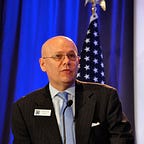John Glenn: the Quintessential America
NOTE: This article originally appeared at BreakPoint, the website of The Colson Center for Christian Worldview.
The death of John Glenn this week marked the passing of a generation.
He had a distinguished military career, serving in World War II and Korea, where he flew the iconic F-86 fighter jet. He became one of the original Mercury Seven astronauts and he was that elite club’s last survivor. He made history as the first American to orbit the earth. He was a central figure in New Journalism pioneer Tom Wolfe’s seminal book The Right Stuff. He leveraged his status as an American Hero into a 24-year career in the U.S. Senate. He became a serious presidential candidate. By any reasonable measure, his was a life and death worth noting.
Few secular accounts of his life mention that he was also a lifelong churchman, eventually becoming an ordained elder in the liberal protestant denomination, Presbyterian Church (USA). He often spoke of his faith in God. In fact, during his second trip into space, as a 77-year-old crew member of the Space Shuttle in 1998, he did a “space-to-earth” news conference and told the world: “Looking at the Earth from this vantage point, looking at this kind of creation and to not believe in God, to me, is impossible. To see (Earth) laid out like that only strengthens my beliefs.”
John Glenn also often displayed a strong moral compass. In his autobiography, Glenn wrote that he “was mad” when he was not selected to be the first man in space in favor of Alan Sheppard, who had a well-earned reputation for skirt-chasing. Glenn wrote, “I read [them] the riot act, saying that we had worked too hard to get into this program … to see it jeopardized by anyone who couldn’t keep his pants zipped.”
However, as WORLD Magazine reported, “More than 30 years later, then-Sen. Glenn had learned to see-no-evil. Commenting on the House vote to impeach Bill Clinton, he said: ‘I’m not defending what the president did. But when I look at all the things we’ve been working on — we’re going to dump this for an impeachment process?’”
In fact, in some ways Glenn’s religious and political beliefs are a case study of what has happened to religion in the public square in the 20th century. Glenn would attend church on Sunday and consistently voted for pro-abortion legislation during his career in the U.S. Senate. When the University of Dayton, a Catholic institution, gave Glenn its Leadership With Virtue Award in 2001, pro-life students objected. Kristen Sheridan, then president of the college’s Students for Life chapter, said, “I am very sadly disappointed that a campus that I love and a University where I feel I am receiving an excellent education would make such a choice that disregards the fundamental belief that life is sacred. I believe as a Catholic university we are called to respect life and should honor those who, among other things, work to uphold it as sacred from birth to natural death. Unfortunately, John Glenn has not done this.”
When it comes to protecting marriage, Glenn’s record was mixed. He voted in favor of the Defense of Marriage Act (DOMA) in 1996, but he also voted in favor of providing special rights based on sexual orientation. And it’s important to note that DOMA passed by overwhelming margins then. Even among Senate Democrats it passed 32–14, with Joe Biden and Joe Lieberman voting for it.
Still, it is hard to look at Glenn’s life and not see one worth studying and — in some ways — imitating. When historians look back on 20th century American culture, they will point to John Glenn as the kind of man Americans wanted to be.
